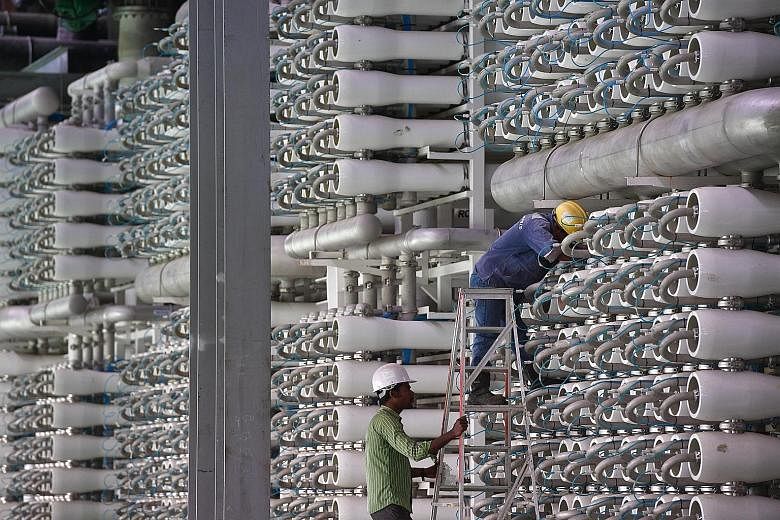The money that people pay for using water is enough to cover only the operations of national water agency PUB and the depreciation of its water works, pipelines and water reclamation plants, Finance Minister Heng Swee Keat said yesterday.
The annual surpluses PUB gets are transferred to its reserves to finance its plants and equipment, he told the House, addressing the issue of the water price hike that surfaced throughout the Budget debate.
"The Government pays for part of the total cost of securing a safe and clean supply of water for our people and businesses," he added, as he underlined the strategic value of water and updated members on plans for investments in the water system.
PUB intends to invest $4 billion on additional water infrastructure in the next five years.
The sewerage network will be improved as well. A deep tunnel sewerage system, costing more than $4 billion, will be completed in 2025.
Another $3 billion will be spent on other sewerage network projects, and to strengthen the resilience of the water supply, in the next five years. These expenses exceed the revenue from the water conservation tax, which is expected to be about $1.6 billion in the five-year period, he added.
Over the past three days, MPs had voiced residents' concerns that business and living costs were expected to go up with the 30 per cent hike in water price, which will take effect in two phases, starting in July this year.
Others, however, stressed that water is a precious resource as Singapore's existence hinges on it, and that the price of water should reflect its value.
"Water sufficiency is a matter of national survival," Mr Heng said, as he noted how founding Prime Minister Lee Kuan Yew "obsessed over water since the Separation Agreement".
"Securing a sustainable water supply for Singapore has been an all- consuming pursuit of the Government since Independence. We lodged our water agreements with the United Nations, invested in a strong defence force and developed strong capabilities in water technologies," he added.
"Singaporeans have enjoyed uninterrupted and high-quality drinking water through rainy weather and droughts alike. This is not mere good fortune or our birthright. Rather, it is the result of long-term planning, a can-do attitude, innovation and sound policy," he said.
Mr Heng reiterated a point Environment and Water Resources Minister Masagos Zulkifli made on Tuesday, that the cornerstone of Singapore's policy on water is pricing it on sound economic principles to reflect its "long-run marginal cost" - that is, the cost of supplying the next available drop of water, which is likely to come from Newater and desalination plants.
"This ensures that users will conserve water, and we can make timely investments in the water system," he said.
Yesterday, Ms Sylvia Lim (Aljunied GRC) of the Workers' Party asked why a proposed carbon tax will be implemented only in 2019, but Singaporeans were not given a similar two-year notice for the increase in water price.
Mr Heng said the carbon tax is new and it will take time to study carefully the details before rolling it out. "A more fundamental point is whether Ms Lim agrees that water is of strategic significance and that we should each do our part," he added.


